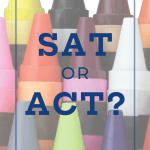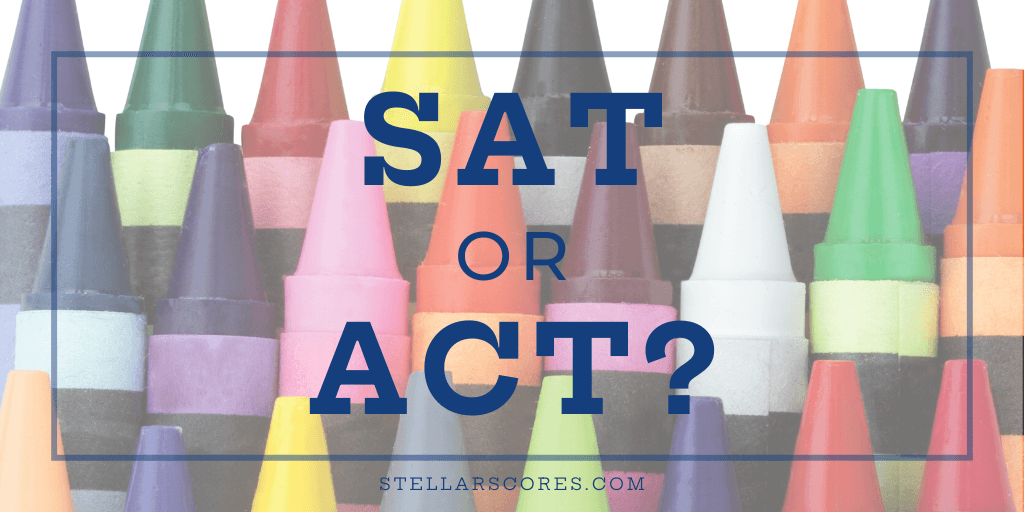Table of Contents
Which test is better?
SAT or ACT? Which test is better? Which test is easier? I hear these questions all the time. They cover similar (through not identical) content, they each take 3 hours to take, and colleges don’t care which test you take. (Of course you’ll want to double-check with the colleges you are interested in to make sure they don’t have a preference – but I haven’t heard of one yet that does!)
The ACT and the SAT have a lot of similarities and some differences as well. Which one is better? Well – it depends on YOUR strengths and weaknesses. For most students, they’ll get good scores on either test. I’ve found about 20% of my students have a HUGE preference – they love one test and hate the other. Which one might be the best fit for you? Here are some key differences to help you decide if the SAT vs ACT is the best test for you.
When are they offered?
The SAT and ACT are usually offered 9 times during the year. They both offer a test date during the summer. The ACT starts a little earlier in the fall with a September test date and a little earlier in the spring with a February test date.
Now, however, with Covid-19, everything is up in the air. Here’s the latest information on upcoming ACT testing dates and here’s the latest information on upcoming SAT testing dates.
What’s covered on each test?
They cover similar material. However the SAT has a no-calculator math section and the ACT has a science section.
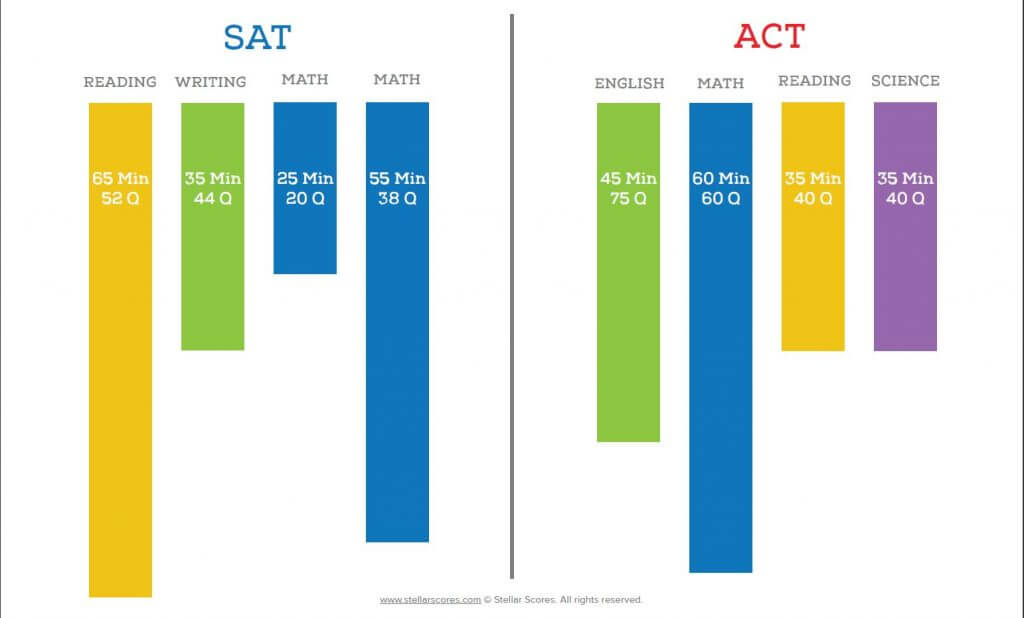
How are they different?
Though they cover similar material, the two tests are also different. The ACT is a lot faster. You have to answer 215 questions in 3 hours. The SAT has 154 questions in the same amount of time.
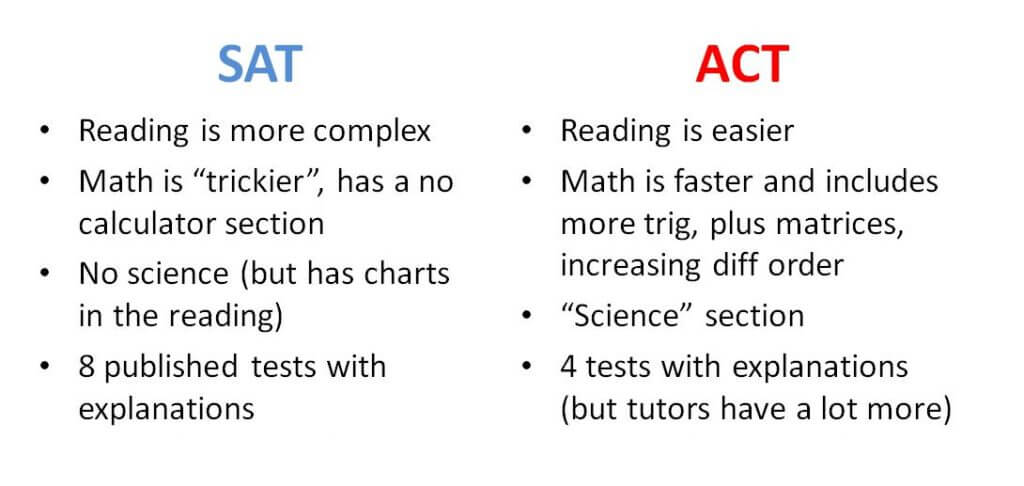
Let me show you what I mean.
Reading
Here’s an example of a reading question from SAT Practice Test 1 and from the 2017-2018 Preparing for the ACT Practice Test, both of which you can download off the respective SAT and ACT websites.
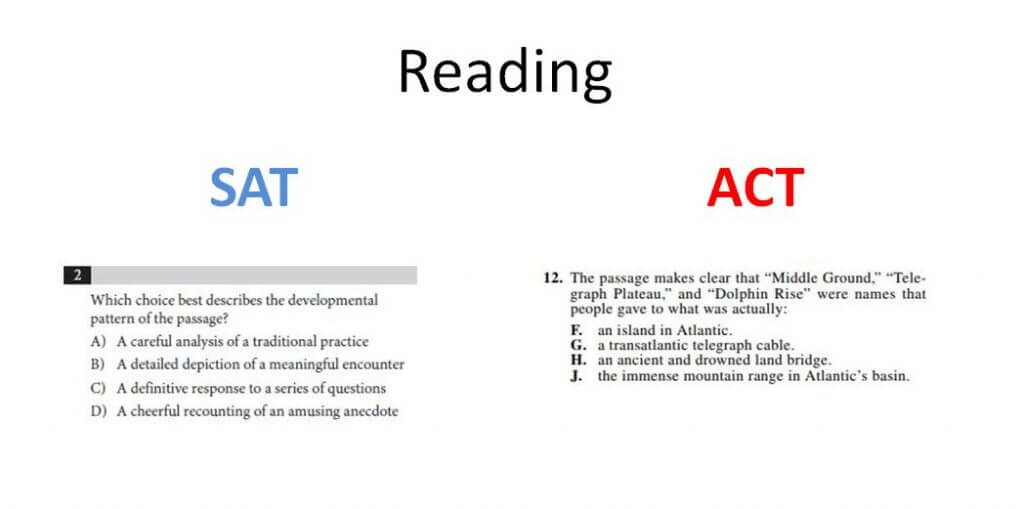
The ACT question asks more of a factual question – what does it say in the passage? The SAT question asks more of a analysis question – how would you describe the passage? Of course, both tests ask questions about literal comprehension, main ideas, inferences, tone and point of view.
Erica Meltzer, who writes my favorite books on both the ACT reading and SAT reading sections, says this about the SAT reading section:
“To some extent, the SAT reading test is a reading comprehension test, but it would perhaps be more accurate to call it an argument comprehension test. It does not simply test the ability to find bits of factual information in a passage, but rather the capacity to understand bow arguments are constructed and the ways in which specific textual elements (e.g. words, phrases, punctuation marks) work together to convey ideas. The focus is on moving beyond what a text says to understanding how the text says it. Comprehension, in other words, is necessary but not sufficient.”
The SAT reading section is harder than the ACT reading section.
Math
Here’s an example from SAT Practice Test 6 and the 2017-2018 Preparing for the ACT Practice Test.
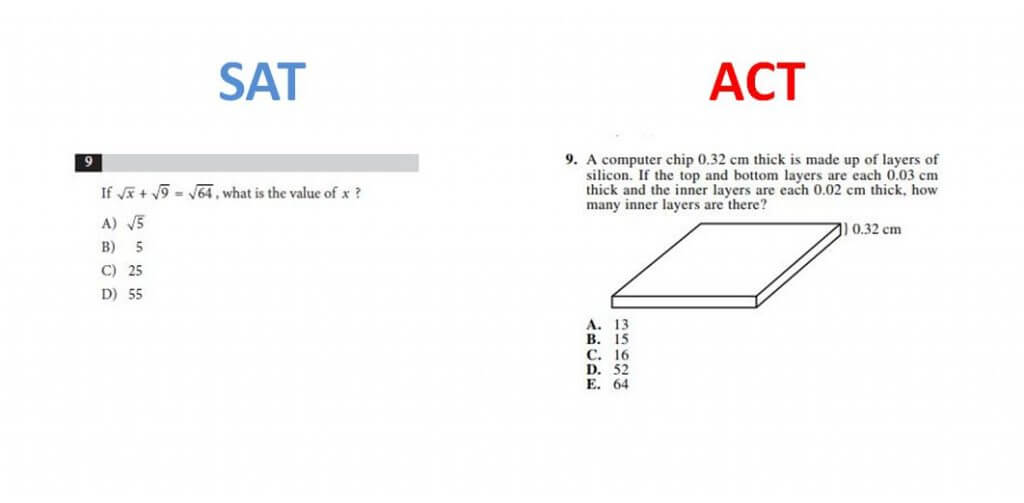
The ACT question is fairly straightforward – take the total thickness, subtract the thickness of the top and bottom layers, then divide the remainder by .02 to figure out how many inner layers there are. Students usually either know how to solve it and get the right answer, or have no idea how to solve it and so just guess A. But they rarely make a mistake while they’re solving it.
On the other hand, students mess up solving this SAT math problem all the time. They move the square root 9 to the right side of the equation, then see that square root 64 is 8 and square root 9 is three, so they then subtract 3 from 8 to get 5 and they chose that as the correct answer. But 5 is what square root x is and the question asks for the value of x, not the value of square root x. So you simply square each side to find that x= 5 squared = 25.
This is a classic SAT math problem. The math isn’t difficult, but the question is asked in such a way that students are more prone to fall into wrong answers.
On the other-hand, many SAT problems are think-through-able – you can think your way through them even if you don’t know the formula you need. I find the ACT questions are less prone to that way of thinking – you either know how to solve it or you don’t. (And you usually don’t have time on the ACT math to try alternative ways of solving the problem)
The ACT covers more math topics – they include matrices and more trigonometry – and you have to move FAST to answer 60 questions in 60 minutes. But they are more like school math problems that most students are used to. And the questions are arranged in difficulty order.
The SAT math questions are GENERALLY arranged in difficulty order, but not entirely. (And it can really throw some students to hit a hard math question early on in the section.) The SAT also gives you a page of math formulas at the front of each math section. But the SAT also has the dreaded no-calculator math section. This can be a deal breaker for some kids.
So it really depends on you as to which flavor of questions you’re most comfortable with.
ACT “Science” section
The ACT Science section isn’t really a science section – you don’t need to know about phyla and physics equations. It should more properly be named the interpreting-charts-and-graphs section. And they are hard, dry, complicated charts and graphs. This section is probably the biggest reason that turns kids away from the ACT.
It’s a hard section but it doesn’t have to be impossible. For kids that are strong readers and reasoners this section can help bump up their scores. There are very specific books and strategies that can help you succeed in the ACT Science section.
Available practice tests
Finally, there’s a big difference in the number of tests that are available for practice.
I strongly believe you should only use authentic test materials.
The SAT has 8 SAT Practice Tests available (Yes, I know they are numbered 1-10, but they dropped Test 2 and Test 4) with full explanations for all of the questions. The ACT has the 2017-2018 Preparing for the ACT Practice Test as well as 4 other practice tests with full explanations in the Official ACT Prep Guide.
If you need more than 8 practice tests, you might want to learn toward the ACT. Even though you can only access 5 ACT tests, tutors usually have many more old tests that they share with their students. Since the SAT changed in 2016, there just aren’t as many tests available to work with.
If you are working on your own, you might want to learn toward the SAT since they have 8 tests with detailed answer explanations.
Each company has an online component with more test questions (Kahn Academy for the SAT and the ACT Online Prep for the ACT) But I have issues with each of those resources that I will explain more thoroughly in another post.
Which test is right for YOU?
So – which test is better? The SAT or ACT? Well – it depends on YOUR strengths and weaknesses. Being a strong reader will help you on both the SAT reading section and the ACT science section. Being fast helps you all over the ACT. Being a creative problem solver helps you in the SAT math section.
But the ultimate proof is in the pudding. Download a SAT practice test and an ACT practice test, take them both (a couple weeks apart!), and see how you do on each test. Did you score higher on one test vs the other? Did you prefer one test vs the other?
Ultimately it doesn’t matter which test you choose. (There’s no one right unicorn test that will magically transform your life simply by choosing the SAT over the ACT or the ACT over the SAT.)
What is much more relevant – even more so than knowing the content (because most kids know the content)- is the time and effort you put into your test prep strategy and execution skills. That’s what separates good scores from great scores regardless of which test they come from.
SAT vs ACT? Which test is better? The time and effort you put into your test prep practice and strategies make much more difference (and separates good scores from great scores) than choosing one test over the other.